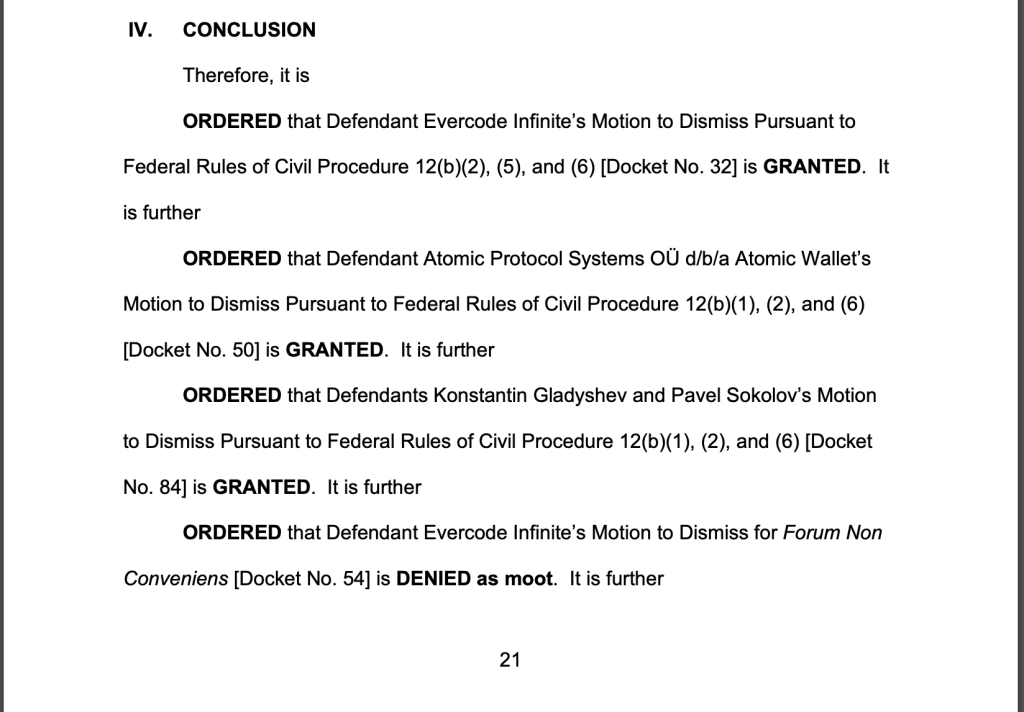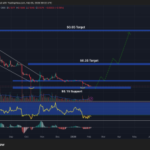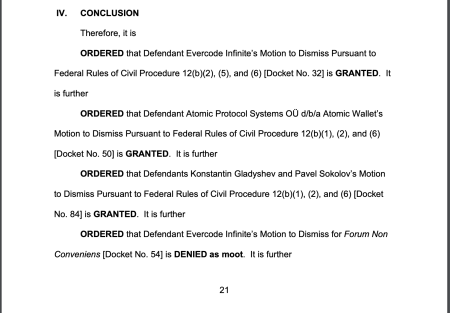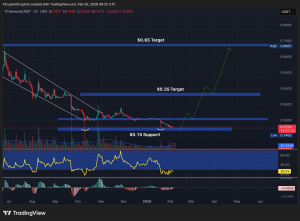Last updated:
 Why Trust Cryptonews
Why Trust Cryptonews

A federal judge in Colorado has dismissed a class-action lawsuit against Atomic Wallet, an Estonian-based cryptocurrency firm, due to insufficient grounds for jurisdiction.
The lawsuit was filed by a group of users who lost funds in a June 2023 $100 million hack targeting the self-custody wallet provider.
Despite the dismissal, Atomic Wallet still faces ongoing challenges as affected users continue their efforts to recover lost funds and explore additional legal avenues.
Court Dismissal and Jurisdictional Issues: What’s Left For The Atomic Wallet Hack Victims?
On September 10, Judge Philip Brimmer of the Colorado District Court ruled that the plaintiffs had failed to establish a strong enough connection between Atomic Wallet and the state of Colorado to justify the court’s jurisdiction.
The case was brought against Atomic Wallet, its CEO Konstantin Gladyshev, shareholder Pavel Sokolov, and Evercode Infinite, the software development company behind the wallet.
The plaintiffs argued that Atomic Wallet’s presence in Colorado was established through the availability of its app for download in the state and advertisements on social media platforms like X (formerly Twitter).
One plaintiff, Colorado resident Graham Dickinson, also cited his regular interactions with Atomic Wallet’s customer support as evidence of the company’s ties to Colorado.
However, Judge Brimmer dismissed these claims, noting that Atomic Wallet’s digital products did not imply a deliberate targeting of Colorado residents.
He emphasized that, unlike physical goods that require shipment to a specific location, software can be accessed globally without the provider’s knowledge of the user’s whereabouts.
This distinction was critical in the judge’s decision, as he determined that Atomic Wallet’s actions did not constitute sufficient engagement with the Colorado market.
Atomic Wallet had previously filed a motion to dismiss the lawsuit in November, arguing that it lacked significant connections to the United States and that only one of the 21 plaintiffs resided in Colorado.
The company maintained that merely having its app available for download in the state or displaying ads visible to Colorado residents did not meet the legal threshold for establishing jurisdiction.

Judge Brimmer concluded, emphasizing that the minimal contact between Atomic Wallet and Colorado was inadequate for the court’s involvement.
Series of Legal Troubles Amid Operational Challenges
The class-action lawsuit was initially triggered by a $100 million hack that compromised around 5,500 wallets in June 2023.
Atomic Wallet users who lost funds in the attack sought legal recourse, aiming to hold the company and its leadership accountable.
The legal battle intensified as the plaintiffs attempted to prove that Atomic Wallet had sufficient ties to the state of Colorado, but their efforts fell short in court.
Despite dismissing most claims, the judge granted the plaintiffs an additional 21 days to bolster their arguments against Ilia Brusov, Evercode Infinite’s co-founder and Atomic Wallet shareholder.
Brusov, like Sokolov, holds a 12.8% stake in the company, while CEO Konstantin Gladyshev owns the remaining 74.4%. This opportunity allows the plaintiffs a final chance to refine their case and possibly keep Brusov involved in the lawsuit.
While the court’s decision represents a significant legal victory for Atomic Wallet, the company continues to face reputational and operational challenges after the security breach.
Affected users remain determined to reclaim their lost funds, exploring other legal options and avenues for recovery.
The court’s dismissal of the lawsuit does not alleviate the broader concerns surrounding the hack or resolve the financial losses experienced by the wallet’s users.
Atomic Wallet’s legal defense rested on the argument that its operations, primarily conducted digitally, did not intentionally target any specific U.S. state, including Colorado.
For the plaintiffs, the court’s decision represents a setback in their pursuit of justice and compensation for the losses incurred during the hack.
However, the additional time granted to strengthen their claims against Brusov provides a narrow path forward for the company.



















